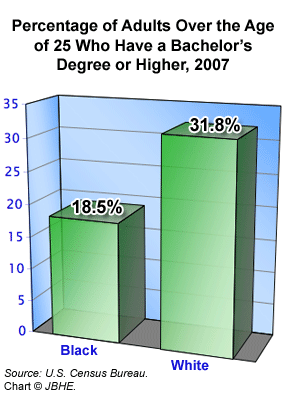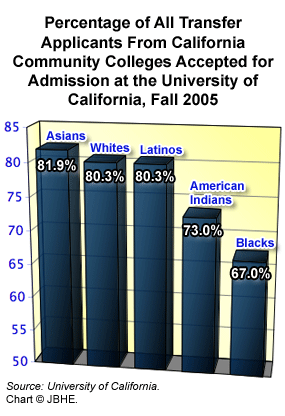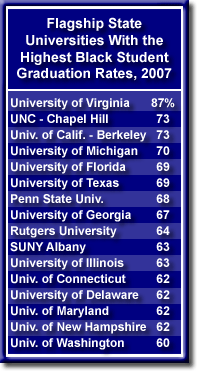The Persisting Racial Gap in Degree Attainments
Last week JBHE reported that 4.2 million African Americans alive today hold a four-year college degree.
Despite the good news, the figures from the U.S. Census Bureau still show that blacks continue to have a huge distance to travel before they reach higher educational parity with white Americans. Overall, 31.8 percent of the non-Hispanic white population over the age of 25 holds a college degree compared to 18.5 percent of adult blacks. This percentage gap has remained steady in recent years.


UNIVERSITY OF NORTH CAROLINA WILMINGTON

Provost and Vice Chancellor for Academic Affairs
UNC Wilmington is committed to creating a powerful and personal learning experience for its 12,000 students. Central to the university’s mission is building and sustaining a strong sense of community with a core mission dedicated to learning through the integration of teaching, research and service.
To lead this effort, the university seeks applications and nominations for the position of Provost and Vice Chancellor for Academic Affairs. This senior officer has broad, dual responsibilities in both academics and administration. As the Senior Academic Officer, the individual selected will work with the faculty to ensure a comprehensive, coherent and challenging curriculum, an excellent and well-supported faculty, and exemplary teaching and learning practices. As Chief Operations Officer, the individual is responsible for ensuring that the organizational structures, processes, personnel, and daily routines of campus life support the realization of the institution’s mission and strategic plan.
UNCW is consistently ranked among the top ten public master’s universities in the south. During the last five years, UNCW has closely followed a strategic plan and has thereby improved its quality; it is recognized by several national rankings for its aggressive progress and excellence. UNCW is one of 16 constituent institutions of the University of North Carolina and offers 73 bachelors, 30 masters, and 2 doctoral degrees (marine biology and educational leadership). Disciplines include arts and sciences, business, education, and nursing. The university community consists of approximately 12,000 students and 2,000 faculty and staff, and is supported by a $211 million operating budget.
Located in the historic, coastal, seaport community of Wilmington, the university is ideally situated between the Cape Fear River and Atlantic Ocean. Wilmington has an active arts, cultural, and business environment and nearby beach communities serve both year round residents and vacationers. Considering the outstanding quality of life enjoyed here and the pleasant climate, Wilmington is truly an extraordinary place to live.
For more information including application instructions, please visit http://www.uncw.edu/provostsearch.
UNC Wilmington actively fosters a diverse and inclusive working and learning environment and is an equal opportunity employer.
Qualified men and women from all racial, ethnic, or other minority groups are strongly encouraged to apply.

Surge in the Number of Black Applicants at Vanderbilt University
 This year there are 172 black freshmen at Vanderbilt University in Nashville, Tennessee. They make up 10.3 percent of the incoming class. This places Vanderbilt fourth in the percentage of black freshmen among the nation’s 30 highest-ranking universities. A decade ago, there were 82 black freshmen at Vanderbilt. Thus over the past decade, the number of black first-year students has more than doubled. This year there are 172 black freshmen at Vanderbilt University in Nashville, Tennessee. They make up 10.3 percent of the incoming class. This places Vanderbilt fourth in the percentage of black freshmen among the nation’s 30 highest-ranking universities. A decade ago, there were 82 black freshmen at Vanderbilt. Thus over the past decade, the number of black first-year students has more than doubled.
Vanderbilt has made a concerted effort to increase racial diversity on its campus. And despite recent successes, the university is not resting on its laurels. Vanderbilt reports that the number of black applicants to this coming fall’s entering class is up 24 percent from a year ago.
Report Predicts That the Subprime Mortgage Crisis May Result in the Largest Loss of Wealth Among African Americans in U.S. History
 Thousands of Americans — both black and white — use the equity in their homes to help finance the higher education of their children. Blacks are already at a severe disadvantage in this regard because less than 50 percent of all black families own their home compared to more than three quarters of white families. In addition, the mean value of housing owned by whites is substantially greater than the mean value of homes owned by blacks. Thousands of Americans — both black and white — use the equity in their homes to help finance the higher education of their children. Blacks are already at a severe disadvantage in this regard because less than 50 percent of all black families own their home compared to more than three quarters of white families. In addition, the mean value of housing owned by whites is substantially greater than the mean value of homes owned by blacks.
Now a new report from the United for a Fair Economy, a Boston-based nonprofit organization dealing with the issue of economic inequality, estimates that the subprime mortgage crisis may result in a loss of wealth for black families of between $71 billion and $122 billion. According to the report, titled Foreclosed: State of the Dream 2008, the subprime mortgage crisis will cause the largest loss of African-American wealth in the history of the United States. The authors of the report state that 40 percent of the losses accrued by blacks are a result of aggressive and unethical mortgage practices by subprime lenders.
This vast loss of wealth by black families will make it more difficult in the years to come for many African-American students to afford the cost of higher education.
New Program in Africana Studies at Long Island University
 This semester the Brooklyn campus of Long Island University is introducing a new minor in Africana studies. The new program includes two introductory courses. In addition, students must select three electives from such courses as This semester the Brooklyn campus of Long Island University is introducing a new minor in Africana studies. The new program includes two introductory courses. In addition, students must select three electives from such courses as  African Film, Caribbean Literature, African-based Art, and Slavery and the Literary Imagination, among others. African Film, Caribbean Literature, African-based Art, and Slavery and the Literary Imagination, among others.
The new minor program is under the direction of Kimberly F. Jones, an associate professor of history, and Carol Allen, an associate professor of English.
Survey Finds a High Level of Historical Illiteracy Among Blacks and Other Minority College Students
 A new study by the Intercollegiate Studies Institute of Wilmington, Delaware, finds that minority students are learning very little about American history and government while in college. The institute surveyed 14,000 college freshmen and seniors on 50 different campuses. The survey included 60 multiple-choice questions on American history and American institutions. Here is one question that appeared on the test: A new study by the Intercollegiate Studies Institute of Wilmington, Delaware, finds that minority students are learning very little about American history and government while in college. The institute surveyed 14,000 college freshmen and seniors on 50 different campuses. The survey included 60 multiple-choice questions on American history and American institutions. Here is one question that appeared on the test:
Abraham Lincoln was elected president during which period?
A. 1800-1825 |
B. 1826-1850 |
C. 1851-1875 |
D. 1876-1900 |
E. 1901-1925
|
Only 61 percent of all college students taking the test knew the correct answer.
The average correct score on the multiple-choice test for minority group seniors was 48.2 percent. This was just eight tenths of a point higher than the average score earned by minority freshmen. Therefore, it appears that minority students are not increasing their knowledge of American history during their college years.
White students didn’t do much better. The average correct score for all senior students on the test was 54.2 percent. This is a failing grade. For students of all races, the average senior score was less than four percentage points higher than the average score for freshmen.
At none of the 50 colleges surveyed — including those in the Ivy League — was the average score better than a letter grade of C.

UNIVERSITY OF LOUISVILLE

Director of Development, University Libraries
The University of Louisville, located in Kentucky's largest metropolitan area, is a state-supported research institution granting undergraduate, graduate and professional degrees. The university seeks a seasoned professional to join an established development team. The Director of Development organizes and implements fund raising activities in support of the University Libraries programs, and creates and implements a comprehensive program of donor relations. This position reports directly to the Associate Vice President for Development, and works closely with the Dean of University Libraries and the Library Associates Board, to market, cultivate, solicit, close, manage and steward gifts. The position works with alumni, donors and donor prospects, staff, volunteers and community leaders. Excellent written and verbal communication skills are critical.
Responsibilities:
- Solicit and close gifts aligned with donors’ interests in support of the university libraries’ programs and university priorities to achieve specified annual and personal goals. Work with the dean, department chairs, faculty, and administrators to identify prospective donors and develop specific plans and strategies that focus on soliciting major gifts in the range of five, six and seven figures.
- Submit major gift and annual fund proposals to achieve university fund raising goals.
- Develop and manage a select portfolio of major prospects of five, six and seven figures and insure that appropriate contact information is recorded in the university’s donor database. Coordinate volunteer and committee fund raising efforts. Assist with other special fund raising projects that are university priorities as requested.
Requirements:
Master’s degree and three years of relevant experience. Additional experience may be used on a one-to-one basis to offset the educational requirements.
Salary: Commensurate with experience.
Application Deadline: Midnight Saturday, March 1, 2008
SUBMIT online application with electronic resume at: http://louisville.edu/jobs/
Click “view/apply for staff positions”
Look for Job #22455

Study by Columbia University Political Scientist Finds That, For Black Voters, Electability Trumps Ideology
 Fredrick Harris, a professor of political science and director of the Center on African-American Politics and Society at Columbia University, recently completed a survey of more than 1,400 voters, more than one third of whom were African Americans. Fredrick Harris, a professor of political science and director of the Center on African-American Politics and Society at Columbia University, recently completed a survey of more than 1,400 voters, more than one third of whom were African Americans.
The survey found that nearly 76 percent of African-American voters believe that electability in the general election is an important consideration when voting in primary elections. Less than 65 percent of white voters considered electability an important factor in their primary choices.
There were other interesting racial differences in political attitudes in the Harris survey. He found that 61 percent of African Americans believed it was important to balance the presidential and vice-presidential ticket by fielding candidates from different regions of the country. Only 42 percent of whites agreed that geographical diversity on the ticket is important.
Some 63 percent of black voters think it is important to balance the national ticket ideologically with both liberal and conservative or moderate viewpoints. Only 40 percent of whites agreed that ideological diversity was important.
In Memoriam
Leonard H.O. Spearman (1929-2008)
 Leonard H.O. Spearman, a college professor and former president of Texas Southern University, has died as a result of a stroke. He was 78 years old. Leonard H.O. Spearman, a college professor and former president of Texas Southern University, has died as a result of a stroke. He was 78 years old.
Dr. Spearman was a native of Tallahassee, Florida, and graduated from Florida A&M University. He went on to earn a master’s and a Ph.D. in clinical psychology from the University of Michigan.
After teaching at Florida A&M and Southern University, in 1980 he was named president of Texas Southern University, the historically black educational institution in Houston. He served in that post for seven years.
Dr. Spearman was U.S. ambassador to both Rwanda and Lesotho. In 2001 he was named executive director of the White House Initiative on Historically Black Colleges and Universities. He was the first leader of this group with previous experience as a president of a black college.
In 2003 the Leonard H.O. Spearman Technology Building was dedicated on the Texas Southern University campus.
James B. Cooley (1918-2008)
James B. Cooley, who spent 41 years as a teacher, high school principal, psychology professor, and college administrator, died last month at the Virginia Commonwealth University Medical Center after suffering a massive stroke. He was 89 years old.
Cooley earned bachelor’s and master’s degrees at Virginia State University. He then was a teacher and a principal of a public high school in Virginia. In 1964 he joined the faculty of Saint Paul’s College, the historically black educational institution in Lawrenceville, Virginia. There he taught psychology and served as director of career planning.
Awards
 • David H. Blackwell, professor emeritus of statistics at the University of California at Berkeley, received an honorary doctorate from North Carolina State University. Dr. Blackwell, now 88 years old, taught on the Berkeley faculty for 35 years before his retirement from teaching in 1989. • David H. Blackwell, professor emeritus of statistics at the University of California at Berkeley, received an honorary doctorate from North Carolina State University. Dr. Blackwell, now 88 years old, taught on the Berkeley faculty for 35 years before his retirement from teaching in 1989.
 • Arielle Drummond, a doctoral student in biomedical engineering at Carnegie Mellon University in Pittsburgh, will receive the 2008 Black Engineer of the Year Award for Student Leadership. The award is given out by Black Engineer & InformationTechnology magazine. • Arielle Drummond, a doctoral student in biomedical engineering at Carnegie Mellon University in Pittsburgh, will receive the 2008 Black Engineer of the Year Award for Student Leadership. The award is given out by Black Engineer & InformationTechnology magazine.
Grants
 • Wallace Community College, which operates campuses in four Alabama cities, received a $10,000 grant from The History Channel. The grant will be used to conduct an oral history project which will involve interviewing African Americans who attended the 21 all-black public schools that operated in Dale County, Alabama, during the Jim Crow era. • Wallace Community College, which operates campuses in four Alabama cities, received a $10,000 grant from The History Channel. The grant will be used to conduct an oral history project which will involve interviewing African Americans who attended the 21 all-black public schools that operated in Dale County, Alabama, during the Jim Crow era.
 • LeMoyne-Owen College, the historically black educational institution in Memphis, Tennessee, received a $200,000 grant from the Southern Heritage Foundation. The funds will be used for general educational purposes. • LeMoyne-Owen College, the historically black educational institution in Memphis, Tennessee, received a $200,000 grant from the Southern Heritage Foundation. The funds will be used for general educational purposes.
|
More Evidence of the Devastating Impact of Proposition 209 on Black Opportunities for Higher Education in California
Each year, thousands of students who complete two-year associate’s degrees at California community colleges apply for admission to the University of California as junior transfer students. Systemwide in 2005 there were 20,339 graduates of California community colleges who applied for admission to one of the nine undergraduate campuses of the University of California. Of these, 80 percent were accepted for admission.
But for blacks the story is sharply different. There were 720 African-American transfer applicants in 2005. But only 483, or 67 percent, were accepted for admission. In fact, blacks were accepted at a lower rate than any other major ethnic group. Latino applicants were accepted at a rate identical to whites.
So for black transfer students, in common with black freshman applicants to the University of California, the lingering impact of the ban on race-sensitive admissions appears to have a severe negative effect on black enrollments.

  |
“I stunned myself when I came to the following conclusion: that in addition to keen intelligence, integrity and a rare authenticity, you exhibit something that has nothing to do with age, experience, race or gender and something I don't see in other candidates. That something is a creative imagination which coupled with brilliance equals wisdom.”
— Toni Morrison, Nobel laureate and professor emerita at Princeton University, in a letter endorsing Barack Obama for president
|
Black Student Graduation Rates at the Flagship State Universities
 By a large margin, the University of Virginia has the highest black student graduation rate of any state-chartered institution in the nation. The black graduation rate at the university is 87 percent. By a large margin, the University of Virginia has the highest black student graduation rate of any state-chartered institution in the nation. The black graduation rate at the university is 87 percent.
The next-highest black student college completion rate at a flagship state university is at the University of North Carolina at Chapel Hill. There, and at the University of California at Berkeley, the black student graduation rate is 73 percent. The University of Michigan has a black student graduation rate of 70 percent.
Twelve other states have flagship universities that post a black student graduation rate of 60 percent or higher. These are the state universities in Pennsylvania, Delaware, New Hampshire, Maryland, Florida, New York, Connecticut, Georgia, Texas, Illinois, Washington, and New Jersey.
Six states and the District of Columbia have flagship state-chartered universities at which the African-American student graduation rate is 34 percent or below. In addition to the University of the District of Columbia, the states that have flagship universities with a black student graduation rate below 34 percent are Alaska, South Dakota, North Dakota, New Mexico, Montana, and Nevada.
Black History Month: The African Pharaohs Who Ruled Egypt
 Many respected scholars have pointed to the significant contributions of black Africans to the civilizations of ancient Egypt and Greece. But this ancient history is unknown to most Americans. Many respected scholars have pointed to the significant contributions of black Africans to the civilizations of ancient Egypt and Greece. But this ancient history is unknown to most Americans.
Now, coinciding with Black History Month, National Geographic magazine is bringing this piece of the past to the masses with the cover story in its February issue. The special feature relates that blacks from Nubia, in what is present-day Sudan, conquered and united Egypt in 728 B.C. They ruled the Egyptian empire for three quarters of a century before being defeated by the Assyrians.
The rise of the Nubian pharaohs of Egypt has been largely ignored by historians, according to the editors of National Geographic, due to racism and the mistaken belief that black Africans could not have been responsible for the splendor of what was ancient Egypt.

OBERLIN COLLEGE

General Counsel and Secretary
Oberlin College seeks its first General Counsel and Secretary to play a key advisory and leadership role with the Board of Trustees, President, Faculty and Staff. The General Counsel and Secretary is the chief legal officer of the College and responsible for managing the College’s legal affairs and overseeing legal services to the College. The General Counsel will monitor and provide advice on legal trends, new or proposed legislation, and administrative rules that may affect College operations or policies. See www.oberlin.edu/HR.
Requirements: J.D. and membership in the Ohio State Bar or eligible for admission to the Ohio State Bar; ten years of progressively responsible legal experience working in higher education or litigating or counseling on higher education issues or the equivalent; highly developed and demonstrated initiative, judgment, diplomacy, and confidentiality; ability to appreciate and respect communication and collaboration within a diverse community. Highly desirable: experience working with governing boards who are responsible for fiscal management.
To facilitate review, applications are preferred in digital form (document or PDF). Submit letter of application and résumé by 2/29/08 to Ginny.O'Dell@oberlin.edu; hard copies may be sent as well to: Virginia O’Dell, Administrative Manager of the President’s Office, Cox Administration Building, Oberlin College, 70 North Professor Street, Oberlin, OH 44074-1090. AA/EOE

Students From 14 Universities Travel to Alabama to Investigate Charges of Racial Discrimination at a Plant Making Licensed Apparel for Their Schools
 New Era Cap Inc. of Buffalo, New York, manufactures licensed apparel for a large number of colleges and universities across the United States. In 2007 a union representing the 900 workers at a New Era manufacturing plant in Mobile, Alabama — 81 percent of whom are black — accused the company of widespread racial discrimination, low wages, unsafe and unclean working conditions, and forced overtime. New Era Cap Inc. of Buffalo, New York, manufactures licensed apparel for a large number of colleges and universities across the United States. In 2007 a union representing the 900 workers at a New Era manufacturing plant in Mobile, Alabama — 81 percent of whom are black — accused the company of widespread racial discrimination, low wages, unsafe and unclean working conditions, and forced overtime.
New Era vehemently denies the accusations. But the company has refused to cooperate in an independent investigation by the Workers Rights Consortium, a group of student organizations formed to monitor college and university contracts with outside licensing companies.
Recently, student delegates from 14 major universities traveled to Mobile to meet with workers at the plant and to investigate charges of unfair labor practices and discrimination. Depending on their findings, the students may return to campus to demand that the universities end their licensing agreements with the company.
  |
822,000 Total number of African-American men in 2007 who held two-year, associate’s degrees.
1,245,000 Total number of African-American women in 2007 who held two-year, associate’s degrees.
source: U.S. Census Bureau
|
University of Maryland Eastern Shore Is the First Black College to Gain Accreditation for its Golf Management Program
 The University of Maryland Eastern Shore has received accreditation for its golf management program. The program is designed for business majors concentrating in marketing or hospitality administration. The University of Maryland Eastern Shore has received accreditation for its golf management program. The program is designed for business majors concentrating in marketing or hospitality administration.
The university is the twentieth college or university in the nation, and the first historically black college or university, to receive accreditation for golf management.
Papers of James Forman to Be Housed at the Library of Congress
.gif) The Library of Congress has announced that it will become the depository for the papers of civil rights activist James Forman. The collection includes more than 70,000 pages of documents, letters, memos, notes, photographs, and other volumes chronicling his years as the executive secretary of the Student Nonviolent Coordinating Committee. The Library of Congress has announced that it will become the depository for the papers of civil rights activist James Forman. The collection includes more than 70,000 pages of documents, letters, memos, notes, photographs, and other volumes chronicling his years as the executive secretary of the Student Nonviolent Coordinating Committee.
Forman was a master of grass-roots organizing. He conducted voting rights drives, planned protest demonstrations, organized sit-ins, established food banks, and built schools. Current congressman from Georgia and civil rights leader John Lewis said of Forman, “He was the glue that held the young people together during the most abrupt time of the civil rights movement.”
After he resigned from the SNCC in 1966, Forman became an advocate of black economic development and called for reparations for slavery.
Forman was a graduate of Roosevelt University in Chicago. Later in life, he completed a master’s degree in African and African-American studies at Cornell University. In 1982 he received a Ph.D. from the Union of Experimental Colleges and Universities.
Forman died in January 2005 from colon cancer. He was 76 years old.
New President Named at Johnson C. Smith University in Charlotte
 Ronald L. Carter was named the thirteenth president of Johnson C. Smith University, the historically black educational institution in Charlotte, North Carolina. He will take office this coming July. Dr. Carter has served since 1977 as provost and dean of the faculty at Coker College in Hartsville, South Carolina. Ronald L. Carter was named the thirteenth president of Johnson C. Smith University, the historically black educational institution in Charlotte, North Carolina. He will take office this coming July. Dr. Carter has served since 1977 as provost and dean of the faculty at Coker College in Hartsville, South Carolina.
Carter is a graduate of Morehouse College. He holds a master’s degree and a Ph.D. in the philosophy of religion from Boston University.

DUKE UNIVERSITY

HBCU Faculty Fellowships, John Hope Franklin Humanities Institute/A.W. Mellon Foundation
Call for Proposals for Fellowships in 2008-2009
Deadline: Monday, March 31, 2008
With support from the A.W. Mellon Foundation, the John Hope Franklin Humanities Institute at Duke University announces a new fellowship program for humanities faculty at Historically Black Colleges and Universities (HBCUs). The program is designed to support a year of research with many opportunities for interaction and collaboration with Duke faculty and students, and with the scholarly communities at UNC-Chapel Hill, North Carolina Central University, North Carolina State University, and the National Humanities Center.
Two, one-year fellowships will be offered in each of the three years of the program Fellows will be provided with a stipend, medical insurance, an office, library privileges, and a pool of research and/or travel funds. Assistant and Associate Professors will receive a stipend of $40,000; full professors receive $60,000. The program offers an option for one-semester fellowships, but full-year fellowships will be prioritized.
Founded in 1999, the FHI is an interdisciplinary humanities center dedicated to research and teaching in the humanities, arts, and interpretive social sciences. The FHI’s mission encompasses scholarship on issues of social equity, race, and ethnicity in their most profound historical and international dimensions.
To download complete information and application instructions, and for general information on the Franklin Humanities Institute, please visit www.jhfc.duke.edu/fhi/
Prospective applicants are strongly encouraged to contact the FHI before applying. Please write to FHI@duke.edu or call (919) 684-6469.

Floyd Flake, President of Wilberforce University, to Step Down in June
 Floyd H. Flake, the eighteenth president of Wilberforce University, the historically black educational institution in Ohio, announced that he will step down effective June 30. Flake, who served as a congressman from New York, was named president of Wilberforce in 2002. While serving as president of the university, Flake remained pastor of The Greater Allen A.M.E. Cathedral of New York. The Reverend Flake would commute to Ohio each week from his home in New York. In 2007 the faculty at Wilberforce voted no-confidence in Flake, saying that he did not spend enough time on campus. Floyd H. Flake, the eighteenth president of Wilberforce University, the historically black educational institution in Ohio, announced that he will step down effective June 30. Flake, who served as a congressman from New York, was named president of Wilberforce in 2002. While serving as president of the university, Flake remained pastor of The Greater Allen A.M.E. Cathedral of New York. The Reverend Flake would commute to Ohio each week from his home in New York. In 2007 the faculty at Wilberforce voted no-confidence in Flake, saying that he did not spend enough time on campus.
Appointments
 • Carla S. Willis was appointed vice president for university relations at Florida A&M University in Tallahassee. Willis also will serve as executive director of the FAMU Foundation. She was principal gifts officer at the University of Toledo and headed her own development consulting firm. • Carla S. Willis was appointed vice president for university relations at Florida A&M University in Tallahassee. Willis also will serve as executive director of the FAMU Foundation. She was principal gifts officer at the University of Toledo and headed her own development consulting firm.
 • Emma Bradford Perry, professor and dean of libraries at Southern University in Baton Rouge, Louisiana, was elected to a three-year term on the Commission on Colleges for the Southern Association of Colleges and Schools. • Emma Bradford Perry, professor and dean of libraries at Southern University in Baton Rouge, Louisiana, was elected to a three-year term on the Commission on Colleges for the Southern Association of Colleges and Schools.
 • George A. Pruitt, president of Thomas Edison State College in Trenton, New Jersey, was named to a three-year term on the board of directors of the American Association of State Colleges and Universities. • George A. Pruitt, president of Thomas Edison State College in Trenton, New Jersey, was named to a three-year term on the board of directors of the American Association of State Colleges and Universities.
Dr. Pruitt is a graduate of the University of Illinois. He holds a master’s degree from Illinois State University and a doctorate from the Union Institute in Cincinnati, Ohio.
 • Vaughn C. Williams was named to the board of trustees of Stanford University. Williams is a partner in the New York office of the law firm Skadden, Arps, Slate, Meagher & Flom. He is a graduate of Harvard University and the Stanford Law School. In 1969 he served as president of the Stanford Law Review, the first African American to head a law review at a top-ranked law school. • Vaughn C. Williams was named to the board of trustees of Stanford University. Williams is a partner in the New York office of the law firm Skadden, Arps, Slate, Meagher & Flom. He is a graduate of Harvard University and the Stanford Law School. In 1969 he served as president of the Stanford Law Review, the first African American to head a law review at a top-ranked law school.
|
 .
.